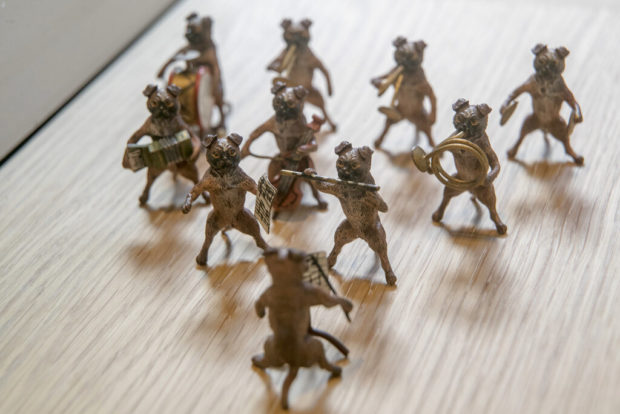
This Jan. 9, 2019, photo shows a miniature Austrian Pug Band, circa 1870, on display at the American Kennel Club Museum of the Dog in New York. AP
NEW YORK — It’s a museum that invites visitors to come! Sit! And stay.
The American Kennel Club Museum of the Dog opens Feb. 8 in midtown Manhattan, returning to New York after three decades on the outskirts of St. Louis.
The collection boasts portraits of royal and presidential pets, artifacts that trace canine history as far back as an estimated 30 million-year-old fossil, and devices that “match” visitors’ faces with dog breeds and let people try their hand at basic dog training with a virtual puppy.
While there won’t be actual dogs except for special occasions, the museum hopes to give visitors “an understanding of the history of dogs, how they came to be in such different variety,” said Executive Director Alan Fausel, a longtime art curator and appraiser seen on PBS’ “Antiques Roadshow.”
About 150 pieces from the kennel club’s extensive, mostly donated collection are on view at the museum, which also has a library area for perusing some of the club’s 15,000 books.
Fanciers will find images and information on canines from bulldogs to borzois to Bedlington terriers. There are some just-don’t-knows, but the collection is focused on purebreds.
The kennel club, which runs the nation’s oldest purebred dog registry, has taken heat over the years from animal-welfare activists who view dog breeding as a beauty contest that fuels puppy mills. The club argues there’s value in breeding to hone various traits, from companionability to bomb-sniffing acumen, and hopes the museum helps make the case.
“I think the best thing to take away is the fact that dogs were meant to have different jobs,” Fausel said. “It’s learning why they were purposely bred for certain jobs, and their activities and their attributes.”
The exhibition ranges from the scientific — such as a skeleton of a 19th-century smooth fox terrier that was important to shaping the breed — to the whimsical, including one of photographer William Wegman’s images of Weimaraners in humanlike situations (in this case, canoeing). There’s also a tiny, elaborate, Edwardian-style dog house for a Chihuahua, and a wall of movie posters celebrating canine stars from “Lassie” to “Beethoven.”
Other pieces speak to dogs’ stature in real life. A painting of a fox terrier mournfully resting its head on an empty armchair depicts Caesar, a pet so cherished by Britain’s King Edward VII that the dog marched prominently in the monarch’s 1910 funeral procession.
The collection also features paintings of White House dogs: U.S. President George W. Bush’s Scottish terriers, Barney and Miss Beazley, and one of President George H.W. Bush’s English springer spaniels, Millie.
“Dogs have enriched our civilization, and woven themselves into our hearts and families through the ages, and I am delighted to see them acknowledged” in the museum, then-first lady Barbara Bush wrote in a 1990 letter.
The museum opened in the kennel club’s former headquarters in New York in 1982. Seeking more space and hoping to attract more than its roughly 15,000 annual visitors, the museum moved in 1987 to a historic house owned by St. Louis County.
Another planned move, to a new development in a nearby city, didn’t materialize. Neither did the hoped-for attendance boost: The museum counted under 10,000 visitors last year, Fausel said.
St. Louis County officials didn’t return a call Thursday, but Parks Director Gary Bess told the St. Louis Post-Dispatch this week the museum’s former home will be rented out for events and exhibits.
It offered something unmatched in the new locale in a high-end Manhattan office tower: Visitors can no longer bring their own pet pooches. And admission rates are higher: $15 for most adults in New York, compared to $6 in St. Louis County.
But the kennel club hopes the new museum, in a glassy street-level space a block from Grand Central Terminal, will boost attendance to 80,000 to 100,000 people this year. /ee